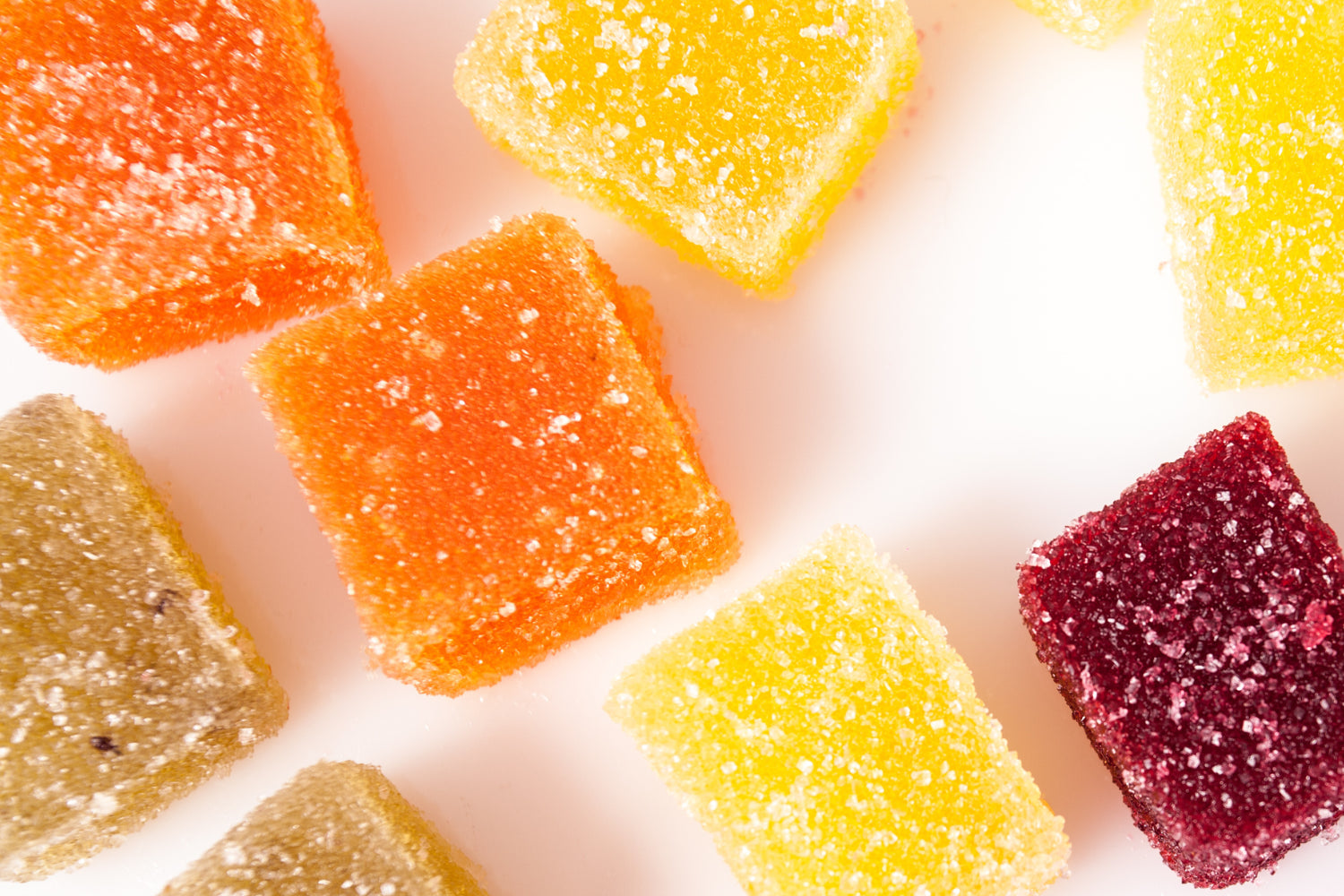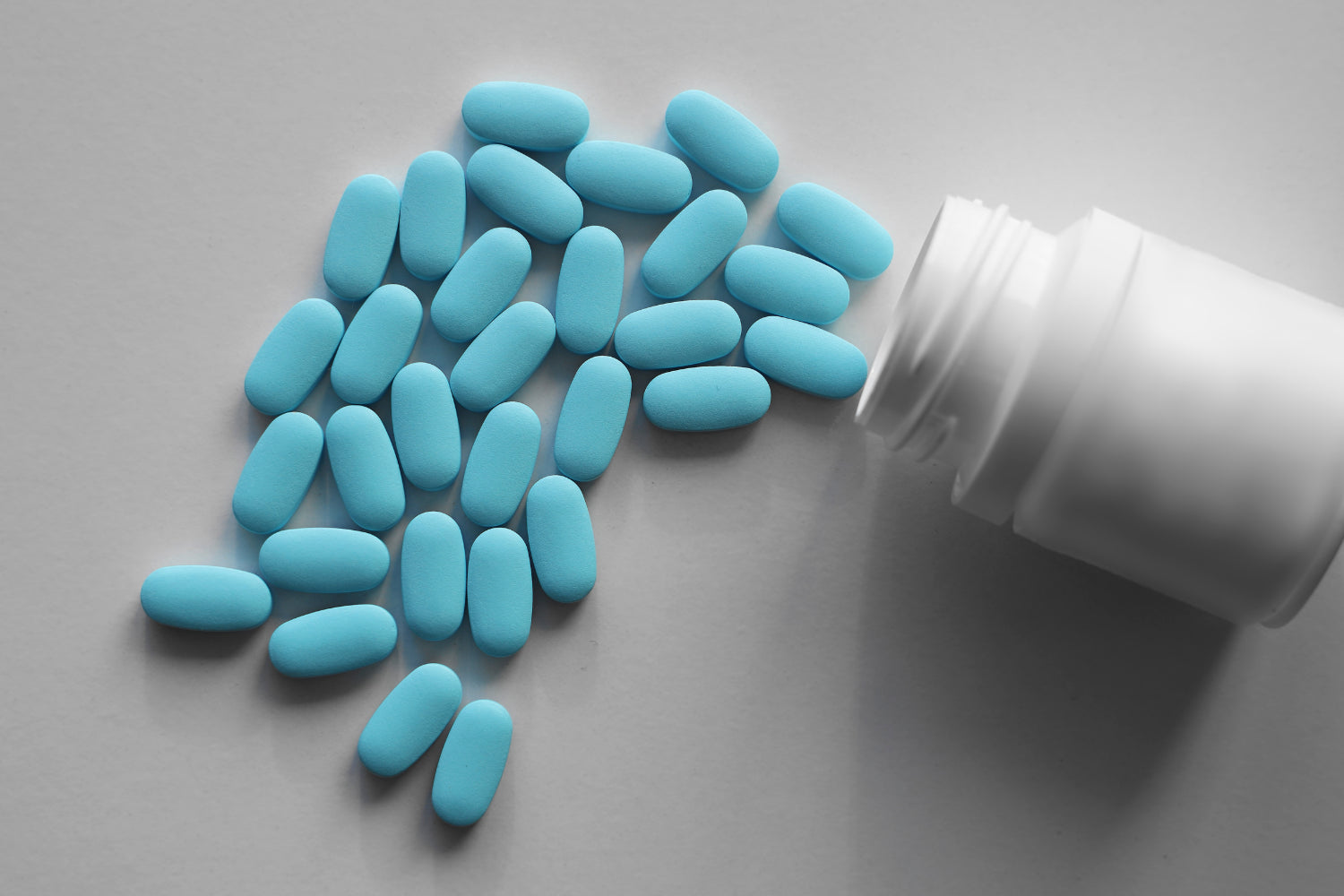While gelatin can now be made with vegan ingredients, it’s hard to forget that this common gummy component originally came from animal sources like horse ligaments and bones. An alternative has appeared in the market over the last few decades — pectin, a plant-sourced substance similar to gelatin, except for its better flavor, texture, and lack of ethical concerns.
What, exactly, is pectin, and why is it better than gelatin? At TrustWorks, we use pectin instead of gelatin, and in this guide, you’ll learn exactly why.
Is Pectin the Same as Gelatin?
No, pectin and gelatin are certainly not the same. They serve similar purposes in gummies and other confections, but they have very different sources, and their textures aren’t exactly the same either.
Compared to pectin, gelatin has a chewier texture, and it has a slimy mouth-feel. Pectin, on the other hand, melts in your mouth, and it’s both easy to swallow and digest.
Plus, we’ve already mentioned that gelatin comes from animals while pectin comes from plants, most commonly fruits like apples and oranges. It’s possible to make gelatin from plants too, but the process is expensive, and the result is inferior to pectin.
What Are Pectin Gummies?
Pectin gummies are edible gummy products that use pectin as a base instead of gelatin. They taste better and are easier to chew than gelatin gummies, and they’re also vegan and don’t cause any harm to animals.
Types of Pectin
- High-methoxyl: Pectin with high concentrations of methoxyl groups, or high-methoxyl (HM) pectin, combines well with sugar and other sweeteners.
- Low-methoxyl: Pectin with low concentrations of methoxyl groups (LM) can congeal even when no sweeteners are present.
- Apple pectin: Some types of fruit pectin are derived solely from apples.
- Modified citrus: Other forms of pectin are derived from citrus fruits, though these natural compounds in citrus peels are usually modified somewhat.
Pectin Uses
Pectin is primarily used as a thickening agent in food and candy manufacturing. It is also sometimes used to make medicines, such as stool softeners and diarrhea cessation drugs due to its ability to coat the intestines. Pectin strips your digestive system of foreign substances, so it’s sometimes used to prepare for drug testing.
What are Gelatin Gummies?
Gelatin gummies contain the outdated ingredient gelatin, which usually comes from animals and isn’t as easily digestible as pectin. While they’re rare these days, it’s important to know how to identify and avoid gelatin gummies.
What is Gelatin Made Of?
While it can be made with other ingredients, gelatin is usually made with the connective tissues of animals such as horses and pigs. As demand for gelatin rose, these animals were sometimes slaughtered just for the substance, leading animal rights groups to demand that alternatives like pectin come into more common usage.
How is Gelatin Made?
Gelatin is most commonly made by melting down unwanted parts of animals that have been slaughtered for meat. It is not, contrary to popular belief, made from animal hooves. It might be easier to harvest gelatin if that were true, however: Instead, gelatin is derived from various internal parts of animal bodies — a messy and unethical business.
Gelatin Uses
Gelatin is primarily used to make gummies and other kinds of confections and baked goods. It is also an important component of certain soups. Additionally, gelatin can be used to help restore connective tissue when used as a supplement. This type of gelatin is sustainably sourced, however, and sold by health food companies, not baking suppliers.
Difference Between Gelatin and Pectin Gummies
Unethical sourcing isn’t the only issue with gelatin gummies. Let’s dive a bit deeper into the differences between gummies made with pectin versus gelatin:
Texture
Pectin gummies are easier to chew than gelatin gummies. They might also not feel quite as “chewy.” For this reason, gummies made with pectin are sometimes called “jellies.” Their texture is, indeed, more jelly-like, even though pectin gummies certainly still have some chew to them.
Source
While gelatin gummies almost always come from animal sources, pectin gummies are sourced from plants. This eliminates any concerns vegans may have, and it also ensures for all of us that we do our part to keep animals out of danger.
Gelling Process
Pectin gels at a much higher temperature than gelatin, roughly 80°C versus 40°C. This means that pectin is also much more stable on the shelf along with being easier to use as a gummy base from a manufacturing perspective.
Shelf Stability
As an animal product, gelatin is more susceptible to changes in heat and humidity. Using gelatin in gummies causes them to last a considerably shorter amount of time on the shelf compared to pectin gummies.
Nutritional Value
Gelatin might have nutritional value if it has been depleted from your ligaments and connective tissues. However, pectin is a form of dietary fiber, which your body needs every day for proper digestion.
Also, pectin is a naturally occurring polysaccharide, a class of compounds that help with cellular maintenance. Pectin gummies can, therefore, be considered to offer improved nutritional value compared to the gelatin equivalent.
Is Gelatin or Pectin Better for Gummy Manufacturing?
Some people may still prefer the texture of gelatin in gummy candies. Most of the world has moved on to pectin gummies, however, which are easier to chew, taste better, mix better with other ingredients, and don’t do any harm to animals.
Pectin is also usually cheaper than gelatin, making it possible to source better-quality ingredients for the same total amount. Overall, pectin is the way of the future, and there’s very little that gelatin gummies still have to offer in comparison.
FAQs
Are pectin and gelatin the same?
No, when comparing pectin vs gelatin, the two ingredients have very different sources, and they impart different textures when used in private label gummies. Gelatin is an animal product while pectin comes from plants. Pectin also is easier to chew and digest while gelatin is nowadays more commonly used as a dietary supplement.
What are the differences between pectin and gelatin gummies?
Gelatin gummies are not vegan while pectin gummies usually are unless other animal ingredients are added. Also, pectin gummies have a “crisper” mouth-feel while gelatin gummies can honestly be hard to chew (especially when they get old). Cheaper, safer, and more ethically sourced — what isn’t there to love about pectin gummies?
Are pectin gummies healthier than gelatin gummies?
Yes, gummies with pectin offer better health benefits than the gelatin equivalent both due to the inherent properties of the two ingredients and the substances they’re often combined with. Gelatin gummies only stabilize with lots of sugar, for instance, but you can leave out all the unnecessary sweeteners with pectin gummies.
Are gelatin gummies vegan?
No, gelatin gummies usually aren’t vegan since gelatin is almost always derived from animals. That’s one of the major problems with gelatin gummies overall.
Are pectin gummies vegan?
Yes, if gummies are made with pectin, that also means they’re vegan — usually. Always check the label to make sure, but since pectin is in itself a vegan substance, there’s no reason to suspect that pectin-based gummies would contain other animal products.
Do gelatin and pectin gummies taste different?
A connoisseur might notice the difference in taste between pectin and gelatin gummies. However, most people will notice the differences in texture between the two substances, not flavor.
Do pectin or gelatin gummies last longer?
Pectin gummy products last longer on the shelf due to the improved properties of pectin overall. As an animal product, gelatin breaks down rather quickly, resulting in a hardened mass that’s nearly impossible to chew.
Are gelatin gummies better for supplements?
No, there’s no circumstance in which gelatin would be any better for gummies than pectin. Overall, pectin is the better ingredient, and almost all gummies are made with pectin these days.
What is powdered pectin?
The right vitamin gummy manufacturer might be able to offer powdered pectin, a highly versatile and useful form of the ingredient that offers even better shelf stability. Ask your TrustWorks representative to learn more.
Conclusion: Work with a Certified Gummy Manufacturer
It’s not enough to stick with what has always worked. Every innovative gummy manufacturer now at least offers pectin as an option, and many have moved away from using gelatin gummy formulas entirely.
From bolstering cell walls to protecting gut health, pectin has many impressive nutritional properties, and it suffers from none of the sourcing issues that will always make gelatin second-best. Choose pectin for better gummies and satisfied customers.



